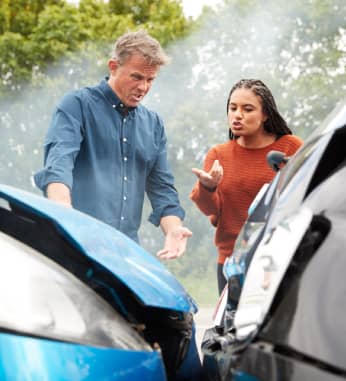No-Fault Accidents
Being involved in a car accident, no matter the severity, can be a challenging experience. If you sustain injuries, especially when the accident was not your fault, it can add further stress. Figuring out what steps to take next and how to cover expenses might be overwhelming. Thankfully, the law provides that if you’re in an accident caused by another party, you shouldn’t bear the burden of the damages they caused.
If you’ve been injured in a car accident due to another party's fault, it's essential to start building your case for compensation.
Car accidents can have varying degrees of impact across the United States. In one recent year,
there were 39,508 fatal car accidents nationwide. These incidents result in different fatality rates
per 100,000 people and per 100 million miles traveled. The types of fatal car accidents are
diverse, showing fluctuations across different states in incidents involving vehicle types like
pick-up trucks, SUVs, cars, pedestrians, and motorcycles.
The common causes of car accidents in the United States are often due to driver negligence and
errors. Speeding, driving under the influence, distracted driving, failing to use safety devices, and
other unsafe driving practices are primary contributors to these incidents.
No matter the circumstances, certain steps should be taken after a car accident to protect
yourself. Ensuring safety, seeking medical attention, and reporting the accident to authorities are
crucial actions. Collecting information and notifying your insurance company are necessary steps
for filing claims and ensuring proper compensation for damages.
If you're not at fault for the accident, the at-fault driver’s insurance should cover your injuries and
damages. However, dealing with insurance companies might not always be straightforward.
Seeking legal counsel can be beneficial in navigating insurance negotiations and securing fair
compensation for your losses.
Understanding the differences between at-fault and no-fault insurance states is crucial. These
systems possess distinctive characteristics related to claim filings and determining liability in car
accidents. Recoverable damages may cover compensatory and, in specific cases, punitive
damages, aimed at addressing medical costs, lost earnings, property damage, and other losses
stemming from the accident.
Exercising caution post-accident is vital, particularly in dealings with insurance adjusters.
Seeking advice from a proficient car accident lawyer can offer essential assistance in navigating
legal intricacies and securing equitable compensation for the sustained damages.
Being involved in a car accident is a stressful and unsettling experience, irrespective of its
severity. If injuries occur, especially when it's clear the accident wasn’t your fault, the situation
becomes even more challenging. You might find yourself wondering about the next steps and
grappling with the thought of covering various expenses. Fortunately, the law is on your side. If
you've been in a car accident caused by someone else, you shouldn’t have to bear the financial
burden for the damages they’ve caused.
Taking action after an accident caused by another party is crucial, particularly when it comes to
building a case for compensation. This process can begin by scheduling a free consultation with
a nationwide car accident lawyer at Local Accident Reports.
The impact of car accidents across the United States varies significantly. In a recent year, there
were 39,508 fatal car accidents across the nation, leading to a range of fatality rates per 100,000
people and per 100 million miles traveled. These fatal accidents encompass diverse scenarios
involving different vehicle types, from pick-up trucks and SUVs to cars, pedestrians, and
motorcycles, with different fatality rates in various states.
Driver negligence and errors, such as speeding, driving under the influence, distracted driving,
failure to use safety devices, and other unsafe practices, are the leading causes of car accidents in
the United States.
Regardless of the situation, certain steps should always be taken following a car accident to
safeguard yourself. Ensuring safety, seeking immediate medical attention, and reporting the
accident to the authorities are crucial steps. Gathering information and notifying your insurance
company are necessary for filing claims and ensuring proper compensation for the damages.
If the accident wasn’t your fault, the at-fault drivers insurance should cover your injuries and
damages. However, dealing with insurance companies can sometimes be complex. Seeking legal
counsel can be invaluable in navigating insurance negotiations and securing fair compensation
for your losses.
It’s crucial to grasp the distinctions between at-fault and no-fault insurance states. Each system
holds unique intricacies in terms of claim processing and establishing liability in car accidents.
Recoverable damages may include compensatory and, in specific cases, punitive damages,
intended to address medical costs, lost income, property damage, and other losses arising from
the accident.
Exercising care after an accident, particularly when engaging with insurance adjusters, is
paramount. Consulting with a proficient car accident attorney can offer invaluable assistance in
navigating legal complexities and securing fair compensation for the sustained damages.
